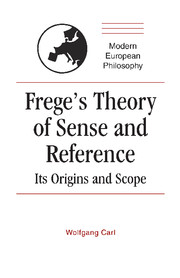Book contents
- Frontmatter
- Contents
- Preface
- Introduction
- 1 Frege's logic
- 2 The separation of the psychological from the logical
- 3 To break the power of words over the human mind
- 4 The thought
- 5 The reference of sentences
- 6 Judgement and knowledge
- 7 The reference and sense of names
- 8 Frege's contributions to epistemology
- Bibliography
- Index
Preface
Published online by Cambridge University Press: 05 June 2012
- Frontmatter
- Contents
- Preface
- Introduction
- 1 Frege's logic
- 2 The separation of the psychological from the logical
- 3 To break the power of words over the human mind
- 4 The thought
- 5 The reference of sentences
- 6 Judgement and knowledge
- 7 The reference and sense of names
- 8 Frege's contributions to epistemology
- Bibliography
- Index
Summary
This book does not purport to be a comprehensive account of Frege's philosophy, nor is it confined to the interpretation of his theory of sense and reference. It is, rather, about this particular theory within the context of Frege's philosophical framework. The book connects considerations concerning the development of his thought and its historical context with an analysis of his main arguments. My aim throughout is to combine these different approaches in order to illustrate and support the general view that Frege's theory of sense and reference belongs to the epistemological tradition of modern philosophy that stems from Kant. I am pleased, therefore, that this book is published within a series entitled “Modern European Philosophy”.
Works by Frege and their translations into English are cited by means of abbreviations, which are explained in the Bibliography. References to Frege's works are given by citing page numbers of the original publication or section numbers where appropriate. The page number first mentioned refers to the German publication; the second, to its English translation. Other works are cited by author's name and an abbreviated title printed in boldface type in the Bibliography.
I have lectured and given seminars on Frege in Göttingen, Florence and Princeton, and I am grateful to patient audiences there for their sympathetic responses and critical suggestions. In many parts of the book I have been greatly helped by criticisms of earlier drafts. I am particularly grateful to Sergio Bernini, Michael Dummett and Lorenz Krüger.
- Type
- Chapter
- Information
- Frege's Theory of Sense and ReferenceIts Origin and Scope, pp. vii - viiiPublisher: Cambridge University PressPrint publication year: 1994

